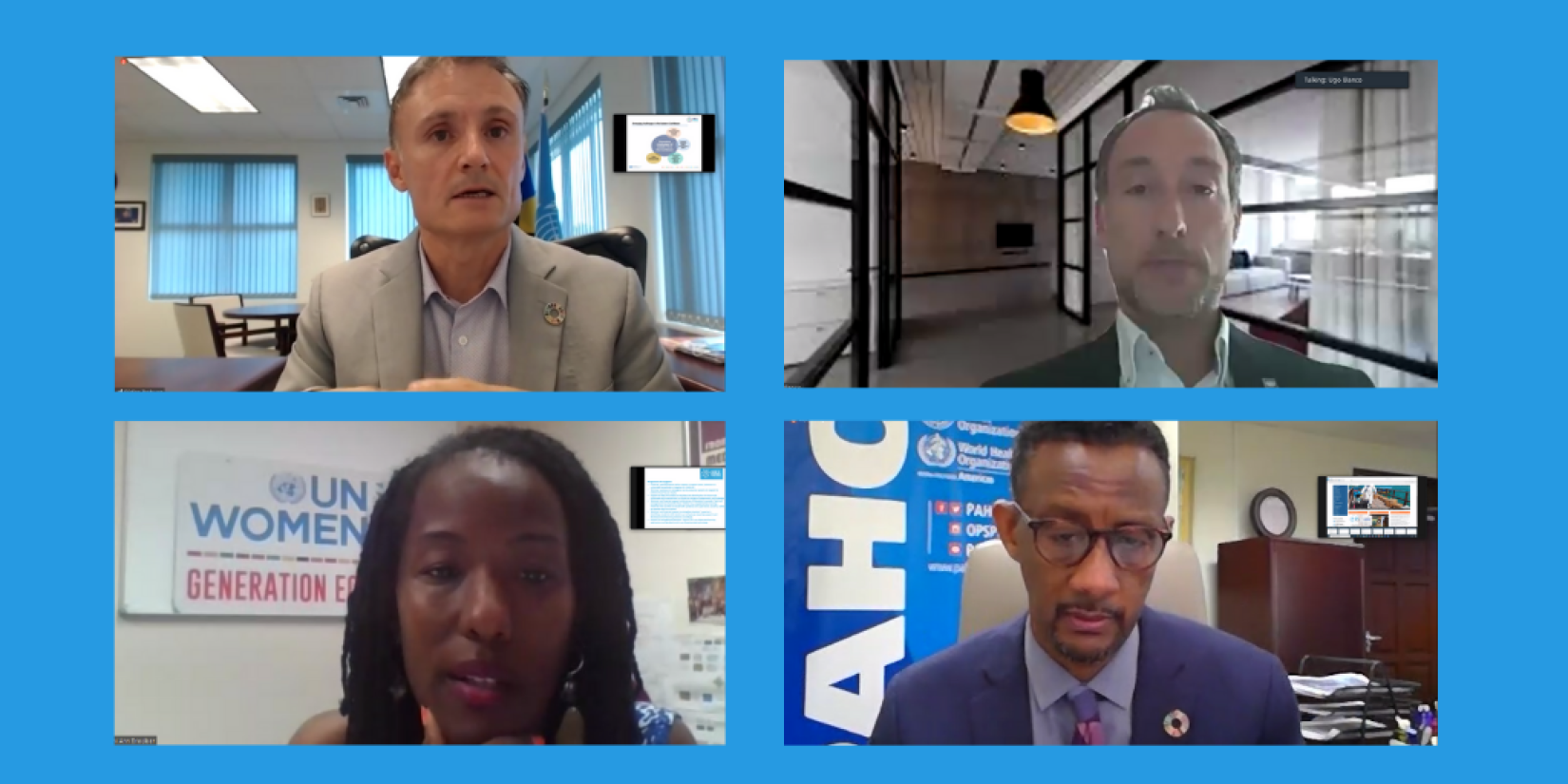Plans for Expansion of UN COVID-19 Multi-Sectoral Plan Underway
03 September 2020
- As regional governments work to build back better from the COVID-19 pandemic, efforts are underway for the expansion of the United Nations’ COVID-19 Multi-Sectoral Response Plan (MRP) to make it more responsive to the countries’ emerging needs.

Launched in May 2020, the MRP provided a successful joint “One UN” response to the sub-region by addressing immediate and short-term needs through an integrated and multi-dimensional approach. Given that the COVID-19 context has evolved over the past months from merely a health crisis to one with far-reaching socio-economic repercussions, the aim is to revisit the MRP to ensure that it remains fit for purpose.
To this end, the United Nations Sub-Regional Team (UNST) for Barbados and the Eastern Caribbean today convened a meeting with regional government officials to discuss the proposed MRP expansion, and to hear directly from them on their needs and priorities which would guide the expanded plan. The devastating impact of COVID-19 on the region’s tourism sector was reiterated by country representatives during the session.
In addressing the meeting, UN Resident Coordinator, Didier Trebucq said that through the MRP the UN has been able to mobilize resources from development partners, to the tune of US $ 24.3 Million, to address the immediate health and socio-economic needs. He noted, however, that the emerging challenges of COVID-19 in the Caribbean, include, but are not limited to, social protection and challenges with the informal sector, innovation and connectivity and shock responsiveness to health systems.
Addressing these challenges, representatives from the UN Sub-regional team presented three clustered approaches on how the UN system can contribute to countries and minimize the issues highlighted.
Presenting on the health and security approach, PAHO representative Yitades Gebre underlined that “heath systems must be resilient” and equity must be at the heart of the response. He maintained that COVID-19 has transcended a health crisis and should be deemed a human crisis. To minimize gaps in the health sector, the PAHO head explained that the UN will support countries in building information systems for health, increasing access to medicines and equipment and strengthening capacity for preparedness and response to public health and disaster emergencies.
Deputy Representative for UNDP, Ugo Blanco, said the acceleration of the digital economy was identified as a top priority. He maintained that “governments have identified the need to minimize the social and economic impact of COVID-19 through digitalization, in preparation for a possible second wave”. The UNDP spokesman highlighted the importance of adequate ICT policies and regulations that would further attract investment, with emphasis on youth entrepreneurship. The digital space constitutes a key entry point to partner with governments and national institutions are already taking steps to innovate.
Deputy Representative for UN Women, Tonni Brodber, underscored that the motto “Nothing for us, without us” was a guiding principle in the UN’s social response. Significant guidance was taken from countries in order to provide the best support.
The first implementation of the MRP revealed various socio-economic impacts on Caribbean communities and the increased demand of social assistance and social assurance. The UN system is proposing to support countries by providing financial, operational and policy support to expand social protection to vulnerable households and to strengthen social protection systems in responding to COVID-19 and future shocks.
Governments have been encouraged to continuously share their inputs throughout this process and will reconvene with the UNST in October to validate the framework of the expanded plan.
Moving forward, the MRP 2.0 will be strategic, integrated and align with the UN reform. Mirroring the global economic framework, the expanded plan will be a unique model driven by the efforts of a tripartite partnership - inclusive of governments, the UNST and International Financial Institutions.

Carol A. Gaskin
In her capacity, she leads communication and advocacy efforts for the UN Resident Coordinator's Office, overseeing operations in 10 Eastern Caribbean countries. Additionally, she chairs the UN Communications Group, fostering collaboration among communicators from 18 agencies.
Carol's expertise lies in developing communication strategies aligned with the Sustainable Development Goals and the 2030 Agenda. She excels in storytelling, utilizing various channels to amplify the UN's message effectively.
Her achievements include coordinating impactful events such as the "UN in the City" SDG exhibition and spearheading initiatives like the introduction of the Caribbean's first SDG-branded electric bus. Notably, Carol has received recognition for her outstanding work, including the Best Annual Results Report for Latin America and the Caribbean in 2023.
Her work extends to humanitarian efforts, notably providing coverage during natural disasters like the La Soufriere eruption.
With a proven track record of success and dedication to advancing global priorities, Carol A. Gaskin is a respected figure in the field of international development and strategic communication.

















